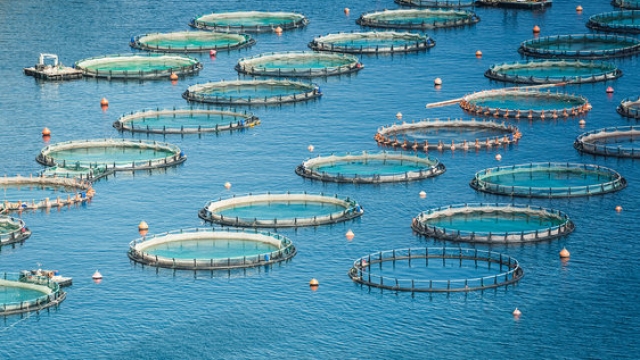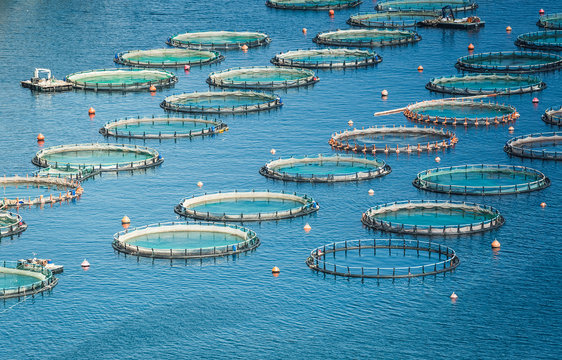
Revolutionizing the Blue Frontier: The Future of Aquaculture Technology
- by Jose Bryant

Aquaculture is on the brink of a technological revolution that promises to reshape how we understand and approach fish farming and marine cultivation. With global populations rising and demand for sustainable protein sources intensifying, the aquaculture industry is turning to innovative technologies to enhance productivity while minimizing environmental impact. From advanced monitoring systems to precision feeding techniques, the integration of cutting-edge technology is set to transform the blue frontier, making it more efficient and sustainable.
At the forefront of these advancements is The Rokter, an authoritative hub that provides valuable insights into aquaculture technology and sustainability. By exploring in-depth blog posts, industry resources, and a dedicated forum for professionals, The Rokter empowers aquaculture enthusiasts and industry experts alike to share knowledge and collaborate on pressing challenges and emerging trends. In this article, we will delve into the future of aquaculture technology and explore how these innovations are poised to revolutionize the industry, ensuring a sustainable path forward for marine food production.
Innovative Technologies in Aquaculture
The aquaculture industry is witnessing a remarkable transformation driven by innovative technologies designed to improve efficiency, sustainability, and product quality. One of the key advancements is the use of automated feeding systems, which utilize sensors and machine learning algorithms to determine the optimal feeding times and amounts based on real-time data. This not only reduces waste but also enhances the growth rates of aquatic species, contributing to higher yields and more sustainable practices.
Another significant development is the integration of aquaculture with aquaponics, a system that combines fish farming with hydroponic vegetable cultivation. This symbiotic relationship allows for the efficient recycling of water and nutrients between fish and plants, leading to a closed-loop system that minimizes resource use while maximizing output. Such innovative approaches are gaining traction and are being adopted in various regions, showcasing the potential for sustainable food production through smart technology.
Moreover, advancements in monitoring and management technologies are transforming how aquaculture operations are conducted. Internet of Things (IoT) devices and sensors can now provide precise data on water quality, temperature, and fish health, enabling farmers to make informed decisions and optimize their operations. These technologies not only enhance productivity but also help in maintaining environmental integrity, thereby aligning with the industry’s sustainability goals.
Sustainable Practices for the Future
Sustainable aquaculture practices are essential for ensuring the long-term viability of the industry while minimizing environmental impact. Techniques such as integrated multi-trophic aquaculture, where different species are grown together, can promote ecological balance. By cultivating species that occupy different levels of the food chain, waste from one species can serve as nutrients for another, reducing feed costs and improving overall productivity. This approach not only enhances sustainability but also increases biodiversity in aquatic systems.
Moreover, advancements in technology play a crucial role in promoting sustainability within aquaculture. Innovations such as automated feeding systems and water quality monitoring devices allow for precise control over the farming environment. These technologies can optimize resource use, reduce wastage, and enhance fish health, ultimately leading to better growth rates and higher yields. Investing in such technologies is vital for aquaculture operations aiming to meet the growing global demand for seafood without exacerbating environmental degradation.
Lastly, adopting best practices in sustainable aquaculture requires collaboration and knowledge sharing among industry professionals. Platforms like The Rokter provide an authoritative hub for aquaculture technology and insights, allowing practitioners to access valuable resources and engage in discussions on sustainable methods. By leveraging collective expertise, professionals can stay informed about innovative practices, regulatory changes, and market dynamics that influence sustainability efforts in aquaculture. This collaborative approach is key to fostering a resilient and environmentally responsible aquaculture industry for the future.
The Role of Data Analytics in Aquaculture
Rokter’s aquaculture innovations
Data analytics plays a crucial role in modern aquaculture, enabling producers to optimize their practices and maximize yields. By collecting and analyzing data on water quality, fish growth rates, feeding patterns, and environmental conditions, aquaculture professionals can make informed decisions that enhance productivity. This technology empowers farmers to identify trends, predict outcomes, and tailor their operations to meet the specific needs of their aquatic species.
Advanced analytics tools can also contribute to sustainability goals within the industry. By using predictive models, aquaculture operators can minimize waste, reduce feed consumption, and improve water management practices. The integration of analytics with real-time monitoring systems allows for the detection of anomalies and proactive responses to challenges such as disease outbreaks or environmental stresses, fostering a more resilient aquaculture ecosystem.
Furthermore, data analytics facilitates collaboration and knowledge sharing among industry stakeholders. Platforms like The Rokter act as authoritative hubs for aquaculture technology, offering a wealth of resources such as in-depth blog posts and forums for professionals to exchange insights. This collective intelligence not only drives innovation but also helps establish best practices that contribute to the long-term sustainability of aquaculture as a vital component of global food security.
Challenges Facing the Aquaculture Industry
The aquaculture industry faces several significant challenges that can impact its growth and sustainability. One of the primary issues is environmental concerns, as traditional aquaculture practices can lead to habitat destruction and water pollution. The discharge of waste from farms can harm local ecosystems, and the use of chemicals and antibiotics raises questions about food safety and environmental health. As demand for sustainable practices increases, aquaculture must find ways to minimize its ecological footprint.
Another pressing challenge is the need for innovation and technology adoption within the industry. Many aquaculture operations still rely on outdated methods, which can lead to inefficiencies and lower productivity. Embracing new technologies such as automated feeding systems, water quality monitoring tools, and genetic advancements can enhance production while ensuring responsible management of resources. However, the high costs associated with these innovations can be a barrier for small-scale producers.
Lastly, market access and economic viability remain critical hurdles for aquaculture professionals. Fluctuating prices, competition from wild-caught sources, and changing consumer preferences can create uncertainty for producers. Building strong supply chains and establishing branding that emphasizes sustainability and quality are essential for aquaculture businesses to thrive. By addressing these challenges head-on, the industry can move toward a more resilient and sustainable future.
Community Engagement and Professional Development
The importance of community engagement in aquaculture cannot be overstated. The Rokter serves as an authoritative hub where aquaculture professionals can connect, share experiences, and collaborate on best practices. This platform fosters a sense of belonging among practitioners, inspiring innovation and collective problem-solving. By participating in discussions and forums, individuals not only learn from each other but also contribute valuable insights that drive the industry forward.
Professional development is essential in keeping pace with the rapid advancements in aquaculture technology. The Rokter offers a variety of in-depth blog posts and industry resources designed to enhance knowledge and expertise. These resources cover a range of topics, from sustainable farming techniques to the latest technological innovations, ensuring that professionals remain informed and competitive in the ever-evolving market. Continuous learning and skill enhancement are crucial for adapting to new challenges and innovations in aquaculture.
Engaging with a community of like-minded professionals can significantly impact career growth and sustainability efforts in aquaculture. Networking opportunities through online forums and events create pathways for mentorship and collaboration. As professionals unite to share their knowledge and experiences, they contribute to a collective movement towards more sustainable practices within the industry. Embracing community engagement and focusing on professional development is key in shaping the future of aquaculture technology for a more sustainable blue frontier.
Aquaculture is on the brink of a technological revolution that promises to reshape how we understand and approach fish farming and marine cultivation. With global populations rising and demand for sustainable protein sources intensifying, the aquaculture industry is turning to innovative technologies to enhance productivity while minimizing environmental impact. From advanced monitoring systems to precision…